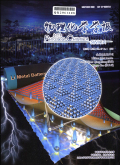物理化学学报2024,Vol.40Issue(7):58-60,3.DOI:10.3866/PKU.WHXB202308017
K修饰MoS2催化剂用于CO2高选择性加氢制甲醇
Enhanced Methanol Selectivity in CO2 Hydrogenation by Decoration of K on MoS2 Catalyst
摘要
Abstract
Selective hydrogenation of CO2 to methanol with renewable H2 is a promising approach to effectively utilize the anthropogenic greenhouse gas CO2 in response to the growing environmental and energy challenges.Recently,MoS2 has gained attention as an attractive catalyst for CO2 hydrogenation due to its tunable S vacancy sites.However,its catalytic reactivity towards methanol production is still unsatisfactory because the general edge S vacancy site tends to favor CH4 formation.Herein,we report that the alkali K decorated MoS2 catalyst enables a dramatically enhancement in selective hydrogenation of CO2 to methanol,in contrast to the pristine MoS2 nanosheets that produce mainly CH4.We incorporated the K promoter into MoS2 using a simple physical mixture method,and we found that the loading of K has a crucial impact on the catalytic performance.The K-MoS2 catalyst with an appropriate K loading of 0.5 wt.%(mass fraction)delivers an optimized methanol selectivity of 81%and a methanol space time yield of 3.6 mmol∙g-1∙h-1 at mild reaction conditions of 220 ℃ and 5 MPa,which greatly outperforms the bare MoS2.Higher K loading would lead CO as the dominating product,while lower K loading is insufficient to tune the selectivity.Detailed characterization techniques,including X-ray diffraction(XRD),Raman,H2-temperature programmed reduction(TPR),electron paramagnetic resonance(EPR),X-ray photoelectron spectroscopy(XPS),CO-diffuse reflectance infrared Fourier transform spectroscopy(DRIFTS),and H2-D2-temperature programmed surface reaction(TPSR),reveal that K atoms tend to occupy the edge sites on MoS2 and serve as electron donators,which enhance the density of states at the Fermi surface and the basicity of the edge active sites,while preventing H2 dissociation on the edge S vacancy.The reaction mechanism,as studied by CO2-temperature programmed desorption(TPD)and CO2+H2 DRIFTS,suggests a reverse water-gas shift route for CO2 hydrogenation to methanol.The increased basicity at the edge active site has therefore facilitates CO2 adsorption and lowers the activation barrier for CO2 dissociation to CO.It also restrains the methanation activity of intermediate CO and directs the reaction path toward CO hydrogenation to methanol.However,the excessive inhibition of H2 dissociation at higher K loading levels causes the facile desorption of CO,resulting in high CO selectivity.These results highlight the appearing effect of K promoter on modulating the edge active sites of MoS2 to favor methanol formation over CH4,and provide a simple yet effective strategy for tuning the structure and catalytic performance of MoS2.This extends the application of MoS2-based catalysts in methanol synthesis via CO2 hydrogenation.关键词
CO2加氢/甲醇/甲烷/选择性调控/K-MoS2Key words
CO2 hydrogenation/Methanol/CH4/Selectivity tuning/K-MoS2分类
化学化工引用本文复制引用
杨菲菲,周维,杨超然,张天雨,黄延强..K修饰MoS2催化剂用于CO2高选择性加氢制甲醇[J].物理化学学报,2024,40(7):58-60,3.基金项目
This work was supported by the National Key Research and Development Program of China(2022YFA1506200),National Natural Science Foundation of China(22208021),Natural Science Foundation of Jiangsu Province,China(BK20231075),the Safety Discipline Group Project of China University of Mining and Technology,China(2022ZZX03),and the Carbon Peak Carbon Neutrality Technology Innovation Special Fund Project of Jiangsu Province,China(BE2022613),and China National Postdoctoral Program for Innovative Talents(BX2021294).国家重点研发计划(2022YFA1506200),国家自然科学基金(22208021),江苏省自然科学基金(BK20231075),中国矿业大学安全学科群项目(2022ZZX03),江苏省碳达峰碳中和科技创新专项资金项目(BE2022613)和中国博士后创新人才支持计划(BX2021294)资助 (2022YFA1506200)

